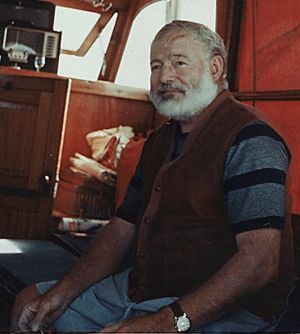Ernest Hemingway
Ernest Hemingway (1899-1961) was a famous American author, born in 1899 in Oak Park, Illinois. His works include:[1]
- The Old Man and the Sea
- A Farewell to Arms
- In Our Time
- The Sun Also Rises
- For Whom the Bell Tolls
- Hills Like White Elephants
- A Clean, Well-Lighted Place
- The Snows of Kilimanjaro and Other Stories
- Dear Papa, Dear Hotch: The Correspondence of Ernest Hemingway and A.E. Hotchner
- A Moveable Feast
He grew up in a Congregationalist home, but quickly in his late teen years became an atheist, also lying to his parents about retaining the faith and praying while in college. He later married into the Roman Catholic faith, although his conversion was not sincere. He also was a compulsive liar, and had a soft-spot for Communists, even turning a blind eye to the Spanish Stalinists massacres in Spain.
He was the man responsible for the making of the Pamplona Bull run popular in an international way.[2] He was also a fan of bullfighting.
He won the Nobel Prize for literature in 1954.[3] In 1961 he committed suicide, but despite this as well as a false conversion to the Roman Catholic faith, was allowed a Roman Catholic burial, as they ruled he was not fully responsible for his actions due to a mental decline in the last months of his life.[4]
Hemingway influenced American literature profoundly.[5] He helped popularize a style of writing that featured plain language, short sentences, and clean, sparse prose. His writing frequently focused on American expatriates living in Europe or Africa. Leading characters are often very masculine, somewhat alcoholic, and suffering from mental scars, but they are always in control of themselves. These characters are believed to be based on Hemingway himself.
In 2011, 50 years after his death, it was revealed that Hemingway had been the subject of an FBI investigation, spurred by J. Edgar Hoover's Hoover’s suspicions about Hemingway's activities in Cuba.[6]
